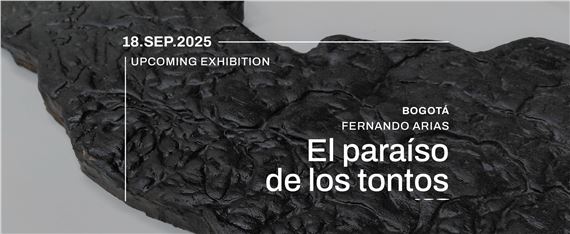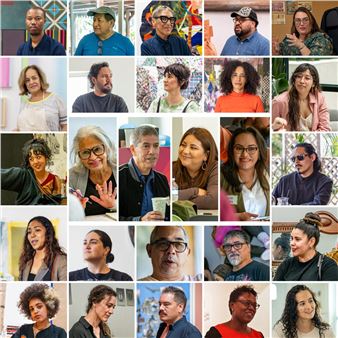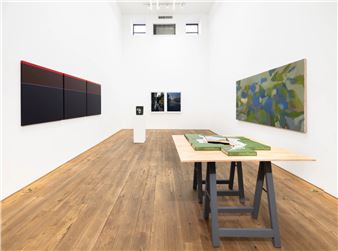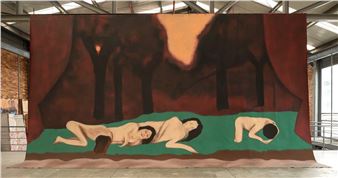Fernando Arias: El paraĂso de los tontos
The Fool’s Paradise confronts the fiction of a stable world. Climate change is not a natural accident but the spatial manifestation of structural inequalities. Entire regions are sacrificed to sustain the promise of prosperity for others, while centers of power indulge in the illusion of continuity. Paradise thus appears as the geopolitics of self-deception: a perfect world for the privileged.
Fernando Arias reconstructs a fractured map of the 195 countries recognized by the United Nations. Made of recycled clay, coated in tar, and subjected to fire, the atlas emerges as a puzzle, overlaid with carbonized roses. Tar and fire condense the extractive and energy dynamics that precipitate collapse, and the image returns the certainty of an exhausted time to the viewer. Four countries remain outside the 2015 Paris Agreement: the United States, Iran, Yemen, and Libya, whose purpose was “to keep the global average temperature increase well below 2 °C above pre-industrial levels and to pursue efforts to limit the temperature increase to 1.5 °C” (UNFCCC, 2015). The U.S. case exposes the fragility of climate consensus, reducing environmental policy to an electoral tool rather than a state project. For the other countries, caught in sanctions and internal wars, assuming multilateral commitments are impossible. By isolating them from the logic of the map, Arias turns them into specters, nations excluded from collective responsibility.
The tapestries woven by Kashmiri artisans—produced in a region marked by the floods of the Jhelum River and the conflict over water resources—contain images of floods, deserts, and drops of water. In a formal operation, Arias transforms the immediacy of the digital into surfaces endowed with time, weight, and texture. The fragility of island states, now threatened by rising sea levels, becomes explicit. The Intergovernmental Panel on Climate Change has warned that some ecosystems risk irreversible loss even with a limited temperature increase. In physical terms, the thermal expansion of the ocean and the melting of Greenland and Antarctica will produce coastal erosion, salinization of aquifers, and the disappearance of territories.
The exhibition avoids the promise of redemption. There is no consolation, no horizon of salvation. The diagnosis is brutal: the devices of modernity cannot provide solutions to reverse climate change. If any truth remains, it is that we inhabit the ruins of a paradise, and that the cost of sustaining this illusion is immeasurable.

Recommended for you
The Fool’s Paradise confronts the fiction of a stable world. Climate change is not a natural accident but the spatial manifestation of structural inequalities. Entire regions are sacrificed to sustain the promise of prosperity for others, while centers of power indulge in the illusion of continuity. Paradise thus appears as the geopolitics of self-deception: a perfect world for the privileged.
Fernando Arias reconstructs a fractured map of the 195 countries recognized by the United Nations. Made of recycled clay, coated in tar, and subjected to fire, the atlas emerges as a puzzle, overlaid with carbonized roses. Tar and fire condense the extractive and energy dynamics that precipitate collapse, and the image returns the certainty of an exhausted time to the viewer. Four countries remain outside the 2015 Paris Agreement: the United States, Iran, Yemen, and Libya, whose purpose was “to keep the global average temperature increase well below 2 °C above pre-industrial levels and to pursue efforts to limit the temperature increase to 1.5 °C” (UNFCCC, 2015). The U.S. case exposes the fragility of climate consensus, reducing environmental policy to an electoral tool rather than a state project. For the other countries, caught in sanctions and internal wars, assuming multilateral commitments are impossible. By isolating them from the logic of the map, Arias turns them into specters, nations excluded from collective responsibility.
The tapestries woven by Kashmiri artisans—produced in a region marked by the floods of the Jhelum River and the conflict over water resources—contain images of floods, deserts, and drops of water. In a formal operation, Arias transforms the immediacy of the digital into surfaces endowed with time, weight, and texture. The fragility of island states, now threatened by rising sea levels, becomes explicit. The Intergovernmental Panel on Climate Change has warned that some ecosystems risk irreversible loss even with a limited temperature increase. In physical terms, the thermal expansion of the ocean and the melting of Greenland and Antarctica will produce coastal erosion, salinization of aquifers, and the disappearance of territories.
The exhibition avoids the promise of redemption. There is no consolation, no horizon of salvation. The diagnosis is brutal: the devices of modernity cannot provide solutions to reverse climate change. If any truth remains, it is that we inhabit the ruins of a paradise, and that the cost of sustaining this illusion is immeasurable.

 ARTISTS
ARTISTS













